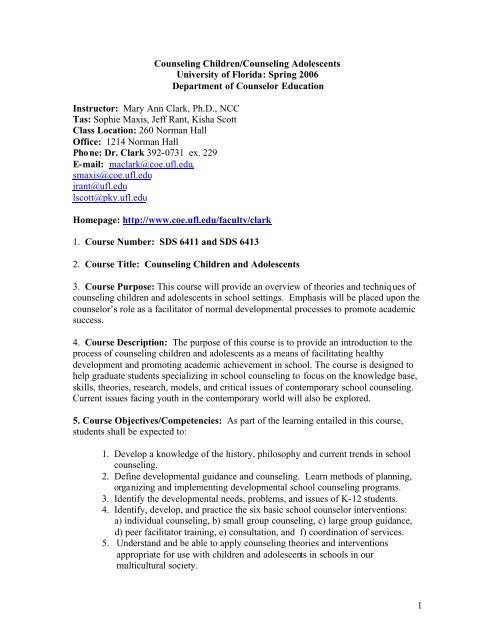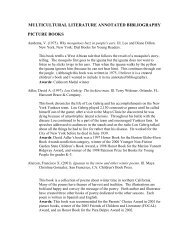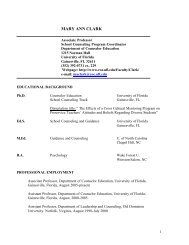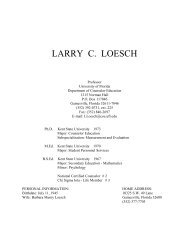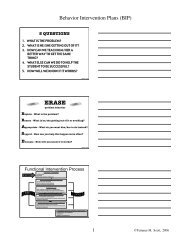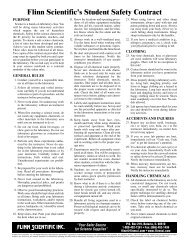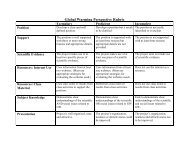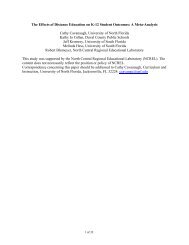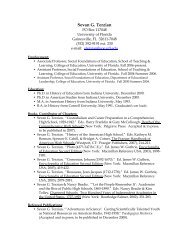Counseling Children/Counseling Adolescents: SDS 6411/6413
Counseling Children/Counseling Adolescents: SDS 6411/6413
Counseling Children/Counseling Adolescents: SDS 6411/6413
You also want an ePaper? Increase the reach of your titles
YUMPU automatically turns print PDFs into web optimized ePapers that Google loves.
<strong>Counseling</strong> <strong>Children</strong>/<strong>Counseling</strong> <strong>Adolescents</strong><br />
University of Florida: Spring 2006<br />
Department of Counselor Education<br />
Instructor: Mary Ann Clark, Ph.D., NCC<br />
Tas: Sophie Maxis, Jeff Rant, Kisha Scott<br />
Class Location: 260 Norman Hall<br />
Office: 1214 Norman Hall<br />
Phone: Dr. Clark 392-0731 ex. 229<br />
E-mail: maclark@coe.ufl.edu,<br />
smaxis@coe.ufl.edu<br />
jrant@ufl.edu<br />
lscott@pky.ufl.edu<br />
Homepage: http://www.coe.ufl.edu/faculty/clark<br />
1. Course Number: <strong>SDS</strong> <strong>6411</strong> and <strong>SDS</strong> <strong>6413</strong><br />
2. Course Title: <strong>Counseling</strong> <strong>Children</strong> and <strong>Adolescents</strong><br />
3. Course Purpose: This course will provide an overview of theories and techniques of<br />
counseling children and adolescents in school settings. Emphasis will be placed upon the<br />
counselor’s role as a facilitator of normal developmental processes to promote academic<br />
success.<br />
4. Course Description: The purpose of this course is to provide an introduction to the<br />
process of counseling children and adolescents as a means of facilitating healthy<br />
development and promoting academic achievement in school. The course is designed to<br />
help graduate students specializing in school counseling to focus on the knowledge base,<br />
skills, theories, research, models, and critical issues of contemporary school counseling.<br />
Current issues facing youth in the contemporary world will also be explored.<br />
5. Course Objectives/Competencies: As part of the learning entailed in this course,<br />
students shall be expected to:<br />
1. Develop a knowledge of the history, philosophy and current trends in school<br />
counseling.<br />
2. Define developmental guidance and counseling. Learn methods of planning,<br />
organizing and implementing developmental school counseling programs.<br />
3. Identify the developmental needs, problems, and issues of K-12 students.<br />
4. Identify, develop, and practice the six basic school counselor interventions:<br />
a) individual counseling, b) small group counseling, c) large group guidance,<br />
d) peer facilitator training, e) consultation, and f) coordination of services.<br />
5. Understand and be able to apply counseling theories and interventions<br />
appropriate for use with children and adolescents in schools in our<br />
multicultural society.<br />
1
6. Acquire the skills necessary to conduct counseling sessions with children and<br />
adolescents utilizing a variety of techniques and interventions.<br />
7. Gain the skills necessary to conduct consultation with parents, teachers, and other<br />
helping professionals concerning students as well as to make appropriate referrals<br />
for specialized help when necessary.<br />
8. Become aware of the multitude of issues and stressors as well as the variety of<br />
cultural, socioeconomic, and lifestyle considerations facing youth in today’s<br />
world.<br />
9. Learn and practice application of computer resources to school counseling.<br />
10. Learn effective counselor accountability strategies.<br />
11. Identify and address ethical, legal, and diversity issues related to school<br />
counseling.<br />
12. Acquire knowledge and understanding of the community, environmental, and<br />
institutional barriers that impede and enhance student academic success and<br />
overall development.<br />
13. Develop an understanding of the counselor as an educational leader in the school.<br />
14. Gain an awareness of policies, laws, and legislation relevant to school counseling.<br />
6. Course Requirements: Final semester grades will be based on total points received,<br />
as related to one of the two courses. More specifically, each of the following indicates to<br />
which course points will be applied. If you have any questions or concerns about grades,<br />
please talk with the instructor.<br />
a. Attendance, readings, assignments, journals, web page, pre-practicum and in-class<br />
activities. Students are expected to attend each class and be on time, complete all<br />
readings and assignments, complete the technology training, and participate in roleplays,<br />
pre-practicum experiences in schools, and class activities. (40 points total:<br />
20 for each course)<br />
b. Exam 1 --------------40 points – <strong>Children</strong><br />
c. Paper 1 --------------30 points -- <strong>Adolescents</strong> (<strong>Children</strong> and <strong>Adolescents</strong> In Need of<br />
<strong>Counseling</strong>) ALSO: RELATED POWER POINT PRESENTATION<br />
d. Paper 2 --------------30 points -- <strong>Children</strong> (<strong>Counseling</strong> Unit for Student Populations)<br />
e. Exam 2-------------- 40 points-- <strong>Adolescents</strong><br />
f. Paper 3 -------------- 30 points --<strong>Children</strong> (Large Group Counselor Interventions)<br />
g. Paper 4 ------------- 30 points --<strong>Adolescents</strong> - (<strong>Counseling</strong> Applied-Theory Into<br />
Practice)<br />
h. Final Exams: 30 points-<strong>Children</strong>, 30 points <strong>Adolescents</strong> (60 total points)<br />
There are two exams during the course, in addition to the two final examinations. The<br />
first two, for 40 points each, are primarily short-answer and multiple choice in format.<br />
The purpose is to help you prepare for the recall of specific information and the<br />
recognition of terms used in developmental guidance & counseling. One of the exams<br />
counts toward <strong>Counseling</strong> <strong>Children</strong> and the other toward <strong>Counseling</strong> <strong>Adolescents</strong>.<br />
The final exams (one for each course) are written essays with 30 points each. In both<br />
exams, there will be one topic which everyone in the course must address, followed by a<br />
2
choice of two others from a list of options. These exams are viewed as comprehensive<br />
and may focus on any area or topic presented in the course.<br />
TOTAL 150 POINTS for EACH CLASS<br />
A = 92-100%<br />
B+= 90-91.9%<br />
B = 84-89.9%<br />
C = 74-83.9%<br />
There will be two computer lab experiences during the semester. The first will be<br />
held as an in-service on EPEP, the latest technological tool for school counselors in<br />
the state of Florida. The other will be on WEBCT which we will use to communicate<br />
our findings on our International Research Project (see paper 4). You will need to<br />
complete these sessions and contribute to the WEBCT site to have met the state of<br />
Florida’s Department of Education Accomplished Practice 12.1. Your participation<br />
in these activities will also be a part of your class participation grade.<br />
7. Accommodating students with special needs: In accordance with university policy,<br />
students with documented sensory and/or learning disabilities should inform the<br />
instructor so that their special needs may be accommodated.<br />
8. Attendance: Class participation is vital for acquiring the knowledge and skills<br />
necessary to achieve the course objectives. Additionally, students’ presence and<br />
participation contributes to the interchange of ideas and experiences. Attendance<br />
and participation are a component of your final grade in this course. Please<br />
be on time! This includes field trips/pre-practicum experiences!<br />
9. Grading: Evaluation is on a 270 point scale with 135 points assigned to each course<br />
component. You will receive course grades for <strong>SDS</strong> <strong>6411</strong> and <strong>SDS</strong> <strong>6413</strong>.<br />
Assignments are due as scheduled. Failure to submit work satisfactorily will result in<br />
a point reduction for the course.<br />
10. Honor Code: “We, the members of the University of Florida community,<br />
pledge to hold ourselves and our peers to the highest standards of honesty<br />
and integrity.” Therefore, the pledge that is expressed or implied on all work<br />
submitted for credit in this course is: “On my honor, I have neither given nor<br />
received unauthorized aid in doing this assignment.” Working together on a team<br />
project and sharing responsibility for completion of a task and a final evaluation is<br />
acceptable under these guidelines.<br />
11. Office Hours: Monday 9:00-10:00 and 1:00-2:00<br />
Wednesday 10:00-12:00<br />
And after class on Thursday<br />
3
Class Meeting Time: Thursday 9:15-10:30 1 st session<br />
10:30-10:45 Break<br />
10:45-12:00 2 nd session<br />
12:45-2:00 3 rd session<br />
2:00-2:15 Break<br />
2:15-3:30 4 th session<br />
12. Course Prerequisites: MHS 5005, MHS 6401<br />
13. Method of Instruction: Lectures by instructor, TAs and guest presenters,<br />
classroom discussions and demonstrations, role-playing, experiential learning<br />
activities, journaling, and pre-practica experiences in schools. Internet resources<br />
will be shared and students will post papers on their individual websites which they<br />
will develop. We will contribute to a CD-ROM which will enable class members to<br />
share group units and information they have researched with one another.<br />
13. Class References: (Required)<br />
Myrick, R. D.(2003). Developmental Guidance and <strong>Counseling</strong>: A Practical<br />
Approach (4th ed.). Minneapolis, MN: Educational Media Corporation.<br />
Haddon, Mark (2003). The Curious Incident of the Dog in the Night-Time.<br />
Target Packet of articles for <strong>SDS</strong> <strong>6411</strong>/<strong>6413</strong> (free of charge and will be<br />
distributed in class)<br />
Recommended: (just a sampling of some of my favorite resources)<br />
American School <strong>Counseling</strong> Association (2003). The ASCA National Model.<br />
Alexandria, VA: Author<br />
Beane, A.L. (1999). The Bully Free Classroom. Minneapolis, MN: Free Spirit<br />
Publishing.<br />
Capuzzi, D. (Ed.) (2000). Youth at Risk: A Prevention Resource for Counselors,<br />
Teachers, and Parents. (3 rd ed.).<br />
Charney, R. S. Teaching children to care. Management in the responsive<br />
classroom (1991). Greenfield, MA: Northeast Foundation for <strong>Children</strong>.<br />
Conari Press, Editors (1994). Kids’ random acts of kindness. Berkeley, CA:<br />
Author.<br />
Erford, B. (Ed). (2004). Professional School <strong>Counseling</strong>: A Handbook of<br />
Theories, Programs, and Practices. (HIGHLY RECOMMENDED as a<br />
supplementary resource)<br />
Foster, E. S. (1989). Energizers and icebreakers. Minneapolis, MN: Educational<br />
Media Corporation.<br />
Gurian, M. (2005). The minds of boys. New York: Tarcher/Putnam.<br />
Kriete., R. (1999). The morning meeting book. Greenfield, MA: Northeast<br />
Foundation for <strong>Children</strong>.<br />
Myrick, R.D. & Erney, T. (2000). Caring and sharing: Becoming a peer<br />
facilitator. Minneapolis, MN: Educational Media Corporation.<br />
Perlstein, L. (2003). Not much, just chillin’: The hidden lives of middle schoolers.<br />
4
Vernon, A. (1999). <strong>Counseling</strong> children and adolescents. (2 nd ed.). Denver: Love.<br />
Wittmer, J. & Clark, M.A. (2002). Teaching <strong>Children</strong> to Respect and Care for<br />
Others. Minneapolis, MN: Educational Media Corporation.<br />
Wittmer, J. & Thompson, D. (1995). Large Group Guidance Activities: a K-12<br />
Sourcebook. Minneapolis, MN: Educational Media Corporation<br />
http://www.schoolcounselor.org (ASCA)<br />
http://www.counseling.org (ACA)<br />
http://www.responsiveclassroom.org<br />
http://www.edtrust.org<br />
http://www.sbac.edu (links to schools, calendars, resources for college)<br />
http://www.cyberguidance.net/ (Bob Turba’s homepage-many resources for high<br />
school guidance and counseling)<br />
http://stats.bls.gov/k12/html/edu_over.htm (Careers for Kids)<br />
http://www.itrc.ucf.edu/sunsations/ (Florida Sunshine State Standards)<br />
http://jtc.colstate.edu/ (Journal of Technology in <strong>Counseling</strong>)<br />
http://www.firn.edu/doe/sas/sasshome.htm (Student Assessment and<br />
Performance)<br />
http://www.ed.gov/nclb/landing.jhtml (No Child Left Behind Act)<br />
http://www.tolerance.org/ (Teaching Tolerance)<br />
http://www.character.org/ (Character Education)<br />
http://www.flacounseling.org/ (Florida <strong>Counseling</strong> Association)<br />
http://info.doe.state.fl.us/fsir/ (Florida School Indicators-data to use on schools<br />
and characteristics-helpful in planning counseling programs)<br />
http://www.actsofkindness.org/ (Random Acts of Kindness materials-lesson<br />
plans)<br />
http://www.ed.gov/teachers/how/read/edpicks.jhtml?src=fp (Improving Student<br />
Performance)<br />
http://www.coe.ufl.edu/Counselor/ (Counselor Education Department homepage)<br />
http://www.florida.echoices.com/eChoices/eChoices.nsf/frmlogin?OpenForm<br />
(Florida e-choices, a computer-assisted education/career program)<br />
http://www.campustours.com/ (virtual campus tours)<br />
http://www.facts.org (Florida Academic Tracking and <strong>Counseling</strong> website) click<br />
on EPEP for new counseling tool<br />
http://nces.ed.gov/programs/coe/2000/essay/e03e.asp (entering kindergartenexamining<br />
gender differences)<br />
In addition, journal articles and internet resources will be recommended.<br />
(See Dr. Clark’s website for updates)<br />
14. GENERAL TOPICS:<br />
? The Developmental Approach to Guidance & <strong>Counseling</strong><br />
? Managing Counselor Interventions – The School Counselor’s Week<br />
? The World of <strong>Children</strong> and <strong>Adolescents</strong><br />
? Talking With <strong>Children</strong> and <strong>Adolescents</strong> --- The Facilitative Model<br />
5
? Assessment of Student Needs and Interests<br />
? The Deviant Child and Adolescent<br />
? Brief <strong>Counseling</strong> & Individual <strong>Counseling</strong> - The Problem-solving Model<br />
? Behavioral <strong>Counseling</strong><br />
? Small Group <strong>Counseling</strong><br />
? Large Group and Classroom Guidance<br />
? Teacher-Advisor Programs<br />
? Peer Facilitator Training and Programs<br />
? Consulting With Parents, Teachers and Principals<br />
? The Counselor As Child Advocate and Educational Leader<br />
? Being Accountable; Using data in program planning and evaluation<br />
? Coordination of Services and Making Referrals<br />
? School Counselors and Computer Technology<br />
? Working with Target Populations (e.g. gender issues, eating disorders/body<br />
image, career planning, school adjustment, depression, family issues, sexual<br />
harassment, teacher-student conflicts, ADHD, learning issues etc.…).<br />
? The Professional School Counselor<br />
? Action Research in School <strong>Counseling</strong><br />
? Examining gender differences in school achievement and counseling<br />
15. Professional Standards:<br />
There are specific professional standards that are addressed in the courses. These come<br />
from the Florida Department of Education and CACREP.<br />
Council for the Accreditation of <strong>Counseling</strong> and Related Educational Programs<br />
(CACREP)<br />
CACREP Core Courses<br />
Section II, Subsection K-1 PROFESSIONAL IDENTITY studies that provide an<br />
understanding of all of the following aspects of professional functioning:<br />
b. professional roles, functions and relationships with other human service providers;<br />
c. technological competence and computer literacy;<br />
g. advocacy processes needed to address institutional and social barriers that impede<br />
access, equity and success for clients;<br />
K-2 SOCIAL AND CULTURAL DIVERSITY studies that provide an understanding of<br />
the cultural context of relationships, issues and trends in a multicultural and diverse<br />
society related to such factors as culture, ethnicity, nationality, age, gender, sexual<br />
orientation, mental and physical characteristics, education, family values, religious and<br />
spiritual values, socioeconomic status and unique characteristics of individuals, families,<br />
ethnic groups and communities, including all of the following:<br />
6
. attitudes, beliefs, understandings, and acculturative experiences, including specific<br />
experiential learning activities;<br />
d. counselors' roles in social justice, advocacy and conflict resolution, cultural selfawareness,<br />
the nature of biases, prejudices, processes of intentional and unintentional<br />
oppression and discrimination, and other culturally supported behaviors that are<br />
detrimental to the growth of the human spirit, mind or body;<br />
K-3 HUMAN GROWTH AND DEVELOPMENT studies that provide an understanding<br />
of the nature and needs of individuals at all developmental levels, including all of the<br />
following:<br />
a. theories of individual and family development and transitions across the lifespan;<br />
b. theories of learning and personality development;<br />
c. human behavior, including an understanding of developmental crises, disability,<br />
exceptional behavior, addictive behavior, psychopathology, and situational and<br />
environmental factors that affect both normal and abnormal behavior;<br />
d. strategies for facilitating optimum development over the life span;<br />
K-5 HELPING RELATIONSHIPS studies that provide an understanding of counseling<br />
and consultation processes, including all of the following:<br />
a. counselor and consultant characteristics and behaviors that influence helping processes,<br />
including age, gender and ethnic differences, verbal and nonverbal behaviors and<br />
personal characteristics, orientations and skills;<br />
b. an understanding of essential interviewing and counseling skills so that the student is<br />
able to develop and therapeutic relationship, establish appropriate counseling goals,<br />
design intervention strategies, evaluate client outcome, and successfully terminate the<br />
counselor-client relationship. Studies will also facilitate student self-awareness so that the<br />
counselor-client relationship is therapeutic and the counselor maintains appropriate<br />
professional boundaries.<br />
f. integration of technological strategies and applications within counseling and<br />
consultation processes;<br />
K-6 GROUP WORK studies that provide both theoretical and experiential<br />
understandings of group purpose, development, dynamics, counseling theories, group<br />
counseling methods and skills, and other group approaches, including all of the<br />
following:<br />
a. principles of group dynamics, including group process components, developmental<br />
stage theories, group members' roles and behaviors, and therapeutic factors of group<br />
work;<br />
c. theories of group counseling, including commonalities, distinguishing characteristics,<br />
and pertinent research and literature;<br />
e. approaches used for other types of group work, including task groups,<br />
psychoeducational groups and therapy groups;<br />
7
K-7 ASSESSMENT studies that provide an understanding of individual and group<br />
approaches to assessment and evaluation, including all of the following:<br />
b. basic concepts of environmental assessment, performance assessment, individual and<br />
group test and inventory methods, behavioral observations and computer-managed and<br />
computer-assisted methods;<br />
c. statistical concepts, including scales of measurement, measures of central tendency,<br />
indices of variability, shapes and types of distributions, and correlations;<br />
d. reliability (i.e., theory of measurement error, models of reliability, and the use of<br />
reliability information);<br />
e. validity (i.e., evidence of validity, types of validity, and the relationship between<br />
reliability and validity);<br />
f. age, gender, sexual orientation, ethnicity, language, disability, culture, spirituality, and<br />
other factors related to the assessment and evaluation of individuals, groups and specific<br />
populations;<br />
g. strategies for selecting, administering, and interpreting assessment and evaluation<br />
instruments and techniques in counseling;<br />
Standards for School <strong>Counseling</strong> Programs<br />
C. KNOWLEDGE AND SKILL REQUIREMENTS FOR SCHOOL COUNSELORS<br />
1. Program Development, Implementation, and Evaluation<br />
c. implementation and evaluation of specific strategies that meet program<br />
goals and objectives;<br />
d. identification of student academic, career, and personal/social competencies and<br />
implementation of processes and activities to assist students in achieving these<br />
competencies;<br />
2. <strong>Counseling</strong> and Guidance<br />
a. individual and small group counseling approaches that promote school success,<br />
through academic, career and personal/social development;<br />
b. individual, group, and classroom guidance approaches systemically designed to assist<br />
all students with academic, career and personal/social development;<br />
c. approaches to peer facilitation, including peer helper, peer tutor, and peer mediation<br />
programs;<br />
d. issues that may affect the development and functioning of students (e.g., abuse,<br />
violence, eating disorders, attention deficit hyperactivity disorder, childhood depression,<br />
and suicide);<br />
e. developmental approaches to assist all students and parents at points of educational<br />
transition (e.g., home to elementary school (<strong>SDS</strong> <strong>6411</strong>), elementary to middle to high<br />
school, high school to postsecondary education and career options (<strong>SDS</strong> <strong>6413</strong>));<br />
h. approaches to recognizing and assisting children and adolescents who may use alcohol<br />
or other drugs or who may reside in a home where substance abuse occurs;<br />
8
3. Consultation<br />
d. knowledge and skills in conducting programs that are designed to enhance students'<br />
academic, social, emotional, career and other developmental needs.<br />
Portions of this course also fulfill in part the following CACREP standards:<br />
A. FOUNDATIONS OF SCHOOL COUNSELING<br />
1. history, philosophy and current trends in school counseling and educational systems;<br />
3. role, function, and professional identity of the school counselor in relation to<br />
the roles of other professional and support personnel in the school;<br />
4. strategies of leadership designed to enhance the learning environment of schools;<br />
7. current issues relevant to school counseling;<br />
10. knowledge and application of current and emerging technology in education and<br />
school counseling to assist students, families, and educators in using resources that<br />
promote informed academic, career, and personal/social choices;<br />
B. CONTEXTUAL DIMENSIONS OF SCHOOL COUNSELING studies that provide<br />
an understanding of the coordination of counseling program components as they relate to<br />
the total school community, including all of the following:<br />
1. advocacy for all students and for effective school counseling programs;<br />
2. coordination, collaboration, referral and team-building efforts with teachers, parents,<br />
and support personnel to facilitate successful student development and achievement of all<br />
students;<br />
3. integration of the school counseling program into the total school curriculum by<br />
systematically providing information and skills training to assist pre-K-12 students in<br />
maximizing their academic, career, and personal/social development;<br />
5. methods of planning for and presenting school counseling-related educational<br />
programs to administrators, teachers, parents and the community;<br />
6. methods of planning, developing, implementing, monitoring, and evaluating<br />
comprehensive developmental counseling programs;<br />
C. KNOWLEDGE AND SKILL REQUIREMENTS FOR SCHOOL COUNSELORS<br />
1. Program Development, Implementation, and Evaluation<br />
e. preparation of an action plan and school counseling calendar that reflect appropriate<br />
time commitments and priorities in a comprehensive developmental school counseling<br />
program;<br />
g. use of technology in the design, implementation, monitoring and evaluation of a<br />
comprehensive school counseling program;<br />
2. <strong>Counseling</strong> and Guidance<br />
e. developmental approaches to assist all students and parents at points of educational<br />
transition (e.g. home to elementary (<strong>SDS</strong> <strong>6413</strong>) elementary to middle to high school, high<br />
school to postsecondary education and career options (<strong>SDS</strong> <strong>6411</strong>));<br />
9
3. Consultation<br />
b. theories, models, and processes of consultation and change with teachers,<br />
administrators, other school personnel and students as appropriate;<br />
c. strategies and methods of working with parents, guardians, families and communities<br />
16. Accomplished Practices (Required Competencies by the Florida Department of<br />
Education)<br />
Indicator: 4.1 (Knowledge)<br />
Knows and identifies strategies, materials, and technologies to develop all PK-12<br />
students’ academic performance and adjustment skills.<br />
Assignment Description:<br />
The candidate will demonstrate knowledge of strategies, materials, and<br />
technologies to develop and enhance students’ academic performance and<br />
personal adjustment skills through performance on written examinations.<br />
Assignment Directions:<br />
Two examinations will be administered during the course and a final exam will be<br />
administered at the end of the semester. There will be a total of 140 points<br />
possible from these examinations. The first two examinations will consist of<br />
multiple-choice and essay question items. The final examination will consist of<br />
(course-comprehensive) essay questions.<br />
The examinations assess a wide variety of important concepts, terms, skills, and<br />
knowledge related to students’ cognitive, social and emotional developments, as<br />
well as to appropriate strategies and resources to help students develop their<br />
academic and personal adjustment skills.<br />
Rating Guide for Indicator 4.1:<br />
Met-<br />
The candidate demonstrates good knowledge of strategies, materials, and<br />
technologies to improve students’ performance by achieving a point total<br />
between 110-140 on the examinations.<br />
Met with Weakness -<br />
The candidate demonstrates minimally sufficient knowledge of strategies,<br />
materials, and technologies to improve students’ performance by<br />
achieving a point total between 100-109 on the examinations.<br />
Not Met -<br />
The candidate demonstrates insufficient knowledge of strategies,<br />
materials, and technologies to improve students’ performance by<br />
achieving a point total between 0-99 on the examinations.<br />
10
Indicator: 4.2 (Skill)<br />
Designs student services activities that develop all PK-12 students’ academic and<br />
adjustment skills.<br />
Assignment Description:<br />
The candidate will develop a large-group (classroom) guidance unit that includes<br />
four (4) structured sessions appropriate for use in the candidate’s intended school<br />
level setting (i.e., elementary, middle or high). The guidance unit developed will<br />
include description of the activities and plan for each session, objectives,<br />
materials and resources to be used, general procedures, processing “hints,” and an<br />
evaluation measure to assess the effectiveness of the intervention.<br />
Assignment Directions:<br />
The candidate will develop a four (4) session unit for use with a large-group (e.g.,<br />
classroom) of students presumably at the school level in which the candidate<br />
intends to work. The unit may be for a Teacher-Advisor Program, peer<br />
facilitation training, character education unit, career education or educational<br />
planning, or similar (approved by the instructor) topic. The (paper) presentation<br />
format is to include an outline of the sessions, processing questions to be asked<br />
and responded to during the sessions, and (school counselor and/or student)<br />
activities. A one page accountability measure to evaluate the unit also must be<br />
presented.<br />
Rating Guide for Indicator 4.2<br />
Met -<br />
The group unit (paper) presented (evaluated to be appropriate and<br />
effective) includes a:<br />
(a) 1 to 2 page description of each classroom session, including<br />
activity title, objectives, materials needed, general procedures, and<br />
processing hints,<br />
(b) one page accountability measure to evaluate the unit,<br />
(c) list of resources and/or materials to be used in each session, and<br />
(d) URL to show that this assignment has been posted to the<br />
candidate’s webpage.<br />
Met with Weakness -<br />
The group unit (paper) submitted effectively fulfills three (3) of the 4<br />
criteria for met, as above.<br />
Not Met -<br />
The group unit (paper) submitted meets fewer than three of the criteria for<br />
met, as above. The student will be required to redo the assignment.<br />
Indicator: 4.3 (Disposition)<br />
Alters/varies student service(s) activities to accommodate students’ cognitive,<br />
social, linguistic, cultural, emotional, and/or physical needs.<br />
11
Assignment Description:<br />
The candidate will demonstrate knowledge of how to accommodate students’<br />
cognitive, social, linguistic, cultural, emotional, and/or physical needs by writing<br />
a research paper on a student with a specific counseling need. The paper will<br />
include use of (i.e., integration of knowledge from) at least six (6) professional<br />
publications and six (6) related internet resources, and an accompanying<br />
PowerPoint presentation.<br />
Assignment Directions:<br />
The candidate will select a target population of students (e.g., in an elementary,<br />
middle, or secondary school) who are in need of (school) counseling services to<br />
address their cognitive, social, linguistic, cultural, emotional and/or physical<br />
needs. The candidate will prepare a (research) paper and accompanying<br />
PowerPoint presentation. The paper and PowerPoint presentations will address (a)<br />
the nature and extent of the problem (resulting from the need) for or among the<br />
targeted students, (b) the behavioral characteristics and manifestations of the<br />
problem, (c) two different (school) counseling intervention strategies that would<br />
be responsive to and presumably helpful for the problem, (d) conclusions and<br />
recommendations, and (e) references.<br />
Rating Guide for Indicator 4.3:<br />
Met -<br />
The research paper presented will contain (evaluated to be appropriate and<br />
effective):<br />
(a) description of the nature and extent of the problem,<br />
(b) behavioral manifestations of the problem,<br />
(c) two school counseling interventions,<br />
(d) conclusions and specific recommendations, and<br />
(e) pertinent references.<br />
Met with Weakness -<br />
The research paper presented will achieve four of the five criteria for met,<br />
as above.<br />
Not Met -<br />
The research paper presented will achieve fewer than four of the criteria<br />
for met, as above. The student will be required to rewrite the paper.<br />
Indicator: 12.1 (Knowledge)<br />
Uses a variety of technologies to enhance student service(s) practice and improve<br />
development and learning for all PreK-12 students.<br />
Assignment Description:<br />
Candidates will satisfactorily complete a two hour training session on EPEP<br />
(ePersonal Educational Planner), the latest technological tool for school<br />
12
counselors to assist students in having a carefully planned and challenging course<br />
of study, from the Florida Department of Education. They will also satisfactorily<br />
complete a training session on WEBCT and will conduct communication about<br />
assigned projects via this medium. They will post a minimum of 4 contributions<br />
(narratives, photos, resources and data) to WEBCT of their research findings.<br />
They will also conduct a minimum of four e-mail exchanges with other students<br />
who are on the WEBCT list.<br />
Rating guide form indicator 12.1:<br />
Met -<br />
The candidate demonstrates good ability to use technologies to enhance<br />
student service(s) by satisfactorily completing the EPEP training offered<br />
by the Florida Department of Education and by making four or more<br />
contributions to WebCT as described above.<br />
Met with Weakness -<br />
The candidate demonstrates minimally sufficient ability to use<br />
technologies to enhance student service(s) by completing the EPEP<br />
training (Florida Department of Education) and by completing a minimum<br />
of three contributions to WEBCT as described above.<br />
Not Met –<br />
The candidate demonstrates insufficient ability to use technologies to<br />
enhance student service(s) EITHER by not completing the EPEP training<br />
or by not completing a minimum of three contributions to WEBCT as<br />
described above.<br />
Topical Outline: Tentative Schedule<br />
Please note that written materials are due on the dates scheduled and are marked with*** ***<br />
January 12:<br />
January 19:<br />
January 26<br />
Getting Organized and Started: Developmental Guidance and <strong>Counseling</strong>;<br />
Preparation of School Counselors; Six Basic School Counselor<br />
Interventions: What Do Counselors do?<br />
Read: Myrick, Chapters 1, 2<br />
The Nature of <strong>Children</strong> and Adolescence; Developmental Issues; Talking<br />
with <strong>Children</strong> and <strong>Adolescents</strong>, The Facilitative Model; Diversity Issues in<br />
School <strong>Counseling</strong>; Looking at gender differences (an introduction to the<br />
Action Research Project)<br />
Read: Myrick, ch. 4, 5<br />
EPEP Training Session at Gainesville High School: Report directly to<br />
GHS at 8:45 (9:00-11:00 session)<br />
13
Computer Lab Experience in Norman 12:45-1:45 WebCT (more about<br />
action research project)<br />
Read: Continue Myrick, Ch. 4, 5: Start reading Target packet<br />
February 2<br />
February 9<br />
February 16<br />
February 23<br />
March 2<br />
March 9<br />
March 16<br />
March 23<br />
Individual <strong>Counseling</strong>; Brief <strong>Counseling</strong>; Problem-Solving Model; Use of<br />
play and various media in counseling; Discussion of Interview Questions<br />
for Action Research Project<br />
Read Myrick, ch. 6; Continue with Target packet<br />
***Paper One (Target Populations) Due***<br />
Small Group <strong>Counseling</strong>, Group Leader Skills (Units & Activities);<br />
Behavioral <strong>Counseling</strong>; Preparation for first session at Howard Bishop MS<br />
Read: Myrick, ch. 7, Target articles<br />
***Exam One***<br />
Howard Bishop Middle School: Pre-Practicum Experience: Meet at<br />
HBMS. Afternoon session back at UF; Large Group (Classroom)<br />
Guidance; Classroom Management Issues;<br />
Read Myrick, ch. 3, 8, and outside resources for group activities; Finsh up<br />
Target articles<br />
Howard Bishop Middle School: Pre-Practicum Experience: Meet at<br />
HBMS. Afternoon session back at UF: Teacher Advisor Programs (TAP);<br />
Peer Facilitator Training and Programs:<br />
Read Myrick, ch. 9<br />
Guest Speaker on counseling high school students on college application<br />
and admissions process: Shifa Hussain, doctoral student and former IB<br />
counselor; Book Group Discussion “Curious Incident of the Dog in the<br />
Nighttime”;<br />
Action Research (Should be working on interviews and e-mail<br />
correspondence) Powerpoint Presentations<br />
***Paper 2 Due*** (Small Group Units)<br />
Working with Troubled <strong>Children</strong> and <strong>Adolescents</strong>; Exceptional Education:<br />
Special Topics; (504 plans etc.) Consultation as a Counselor Intervention:<br />
Powerpoint Presentations<br />
Read Myrick, ch. 10; continuation of e-mail correspondence<br />
Spring Break: No Class<br />
The Counselor and Accountability; Coordination as a Counselor<br />
Intervention<br />
Planning for Take Stock in <strong>Children</strong> Field Trip<br />
Read Myrick, ch. 11,12-continuation of e-mail correspondence<br />
***Paper 3 Due***<br />
14
March 30<br />
April 6<br />
April 13<br />
April 20<br />
April 27<br />
May 4<br />
“Take Stock in <strong>Children</strong>” Field Trip to UF, a.m.:<br />
Working with Parents and Families in Schools; Meggen Tucker Sixbey<br />
and Kisha Scott Facilitators; Continuation of e-mail correspondence<br />
Summary and group presentations on Action Research Project on Gender<br />
Differences; Wrapping up e-mail correspondence; Legal and Ethical<br />
Issues in <strong>Counseling</strong> Minors; Powerpoint Presentations<br />
***Exam 2***<br />
Using Data to Plan <strong>Counseling</strong> Programs; Bill Goodman, Supervisor of<br />
Guidance and <strong>Counseling</strong>, School Board of Alachua County;(9:15-10:30);<br />
Large Group Guidance Sessions:<br />
***Paper 4 Due; Action Research Project Results***<br />
Course wrap up: Finish up Powerpoint Presentations<br />
***Exam***<br />
***Reading Day*** (no class)<br />
Culminating Activity<br />
The instructor reserves the right to amend this document as necessary.<br />
PAPER 1<br />
Guidelines for Papers<br />
CHILDREN AND ADOLESCENTS IN NEED OF COUNSELING<br />
Select a target population to study and confer with instructor. You may choose an area to<br />
study from below, or suggest one of your own. Review at least 6 professional<br />
publications; cite them as references using APA form and at least 6 related WWW sites.<br />
Make hyperlinks on your paper when possible.<br />
1. Preventing Drug/alcohol Abuse Among <strong>Adolescents</strong><br />
2. Suicide Risk -- Prevention of Depression<br />
3. Peer Pressures and Conflicts<br />
4. Loneliness<br />
5. Learning difficulties<br />
6. Bullying<br />
15
7. Sexual Harassment<br />
8. Loss (e.g. Divorce or Separation, or Death)<br />
9. Sexual Development - Identity, Issues and Conflicts<br />
10. Eating Disorders and Weight Control: Issues dealing with body image<br />
11. Self Injurious behavior<br />
12. Motivation and underachievement<br />
13. Psychological Disorders (DSM IV: Examples are ADHD,<br />
Oppositional/Defiant etc.)<br />
14. Teen Pregnancy<br />
15. Ethnic and Cultural Identity Issues<br />
16. Alienated and Adrift from School<br />
19. Youth and Employability<br />
20. Poverty and its effects on school achievement<br />
The following should be addressed in paper #1. Approximate number of paragraphs may<br />
be viewed as a guide to help organize the focus or summary paper and "manage" the<br />
topic. In addition, the common structure makes it easier to share among students in the<br />
course<br />
I. The Extent of the Problem.<br />
In 2-3 paragraphs, use national and state data to show need<br />
for counseling.<br />
II. Behavioral Characteristics.<br />
In 1-2 paragraphs, describe (define) and list observable<br />
behaviors or symptoms.<br />
III. Two Different <strong>Counseling</strong> Strategies.<br />
In 4-8 paragraphs, describe 2 different guidance/counseling<br />
approaches, perhaps listing some of the techniques or<br />
procedures used. Use Internet links where appropriate.<br />
16
IV. Conclusions and Recommendations.<br />
In 1-2 paragraphs, what are your final thoughts and<br />
suggestions?<br />
V. References<br />
(APA form) -- minimum 6 professional journal<br />
publications, and 6 related Internet WWW locations<br />
(URLs) with links.<br />
Use this paper to become familiar with professional journals and Internet sites related to<br />
the work of school counselors. You will have an opportunity to share your findings with<br />
others in the class. You will also prepare a brief powerpoint presentation highlighting the<br />
basic points of your paper. These will be presented in class during the semester.(10-15<br />
minutes), time to be determined.<br />
Put a * by those references which provide statistical data or other evidence to support the<br />
outcomes and show the effectiveness of a strategy.<br />
PAPER 2<br />
COUNSELING CHILDREN AND ADOLESCENTS IN SMALL GROUPS<br />
Design a group counseling unit using structured group activities. It will consist of 6<br />
sessions and may be for elementary, middle or high school students. The assignment may<br />
be done with a classmate, in which case both receive the same number of evaluation<br />
points. Check with instructor before starting.<br />
Description of Sessions: (1-2 pages for each session) Begin each session on a separate<br />
page and use the following outline.<br />
Session 1: “Title of Session” (a brief title for quick reference)<br />
Objectives: Purpose or specific objectives for this session (list).<br />
Materials Needed: (list)<br />
General Procedures: (list in chronological order the steps, tasks, and<br />
activities used in this session).<br />
Processing Hints: (list some suggested questions, leads or tasks for<br />
discussion or when facilitating the group).<br />
Accountability Measure: Evaluation or assessment procedure (1 page)-- How<br />
17
PAPER 3<br />
will you be able to tell if the intervention is effective? Develop a one-page<br />
evaluation form.<br />
Format for a 6 session unit<br />
Session 1- Introductions, Statement of purpose of group, Guidelines for group,<br />
Icebreaker, Short activity to introduce topic/theme of group.<br />
Session 2-Transition-introducing feeling word vocabulary, helping members feel<br />
comfortable and encouraging them to interact with one another-activity related to<br />
theme of group<br />
Sessions 3-5 Working sessions-use activities and discussion to reinforce theme of<br />
group, learn and practice new skills, encourage feedback among one another<br />
Session 6-Closure-Prepare members for ending of group-summarize what has<br />
happened in the previous sessions. Do a go around to have each member say<br />
what the group experience has meant to them; have members give positive<br />
feedback to each other about participation in the group. Do a short written<br />
evaluation of group. (ex. A retrospective measure using a 5 point likert scale)<br />
DEVELOPING A UNIT FOR CLASSROOM GUIDANCE<br />
You will develop a 4 session unit for use with a large group or classroom of children. It<br />
may be a unit for a Teacher-Advisor Program, a peer facilitation training group, a<br />
character education unit for use in the elementary classroom, a career education or<br />
educational planning series of sessions or something else you may be interested in. Use a<br />
similar format to your small group paper/unit with regard to outlining the sessions,<br />
processing questions, and activities. Develop a one page accountability measure to assist<br />
you in evaluating this unit. You may work in small groups of 3-4 and may want to use<br />
this assignment to develop a session for a pre-practicum experience this semester. In this<br />
instance, each group of four will be planning for a specific grade level. Only one or two<br />
of the sessions described will be used at the pre-prac site..<br />
PAPER 4<br />
ACTION RESEARCH PROJECT: Examining Male Underachievement in Public<br />
Education: A Cross Cultural Study<br />
Abstract:<br />
Recent educational statistics and the popular media around the world have reported a<br />
gender gap in academic achievement and school success for boys as a group compared to<br />
girls. Our <strong>SDS</strong> <strong>6411</strong>/<strong>6413</strong> class here at the University of Florida will engage in a joint<br />
18
esearch project with undergraduate and graduate students in Colleges of Education at<br />
Nottingham University (United Kingdom) and Wollongong University (Australia) which<br />
is being supported by the Center for International Studies. We will be carrying out focus<br />
groups with public school students, interviews with elementary and secondary<br />
teachers/school counselors, and collecting quantitative data to investigate this problem<br />
from a cross cultural perspective. Each student in our class will be assigned to small<br />
groups containing at least one from each of the other two universities to compare findings<br />
across our schools and countries to discover themes concerning factors that could<br />
possibly contribute to the gender achievement gap.<br />
Description of the Project: Examining Male Underachievement in Public Education: A<br />
Cross Cultural Study<br />
Our class has been invited to participate in an international research project involving<br />
groups of pre-service students from the University of Florida (School <strong>Counseling</strong><br />
students), University of Wollongong (General Education student teachers) and University<br />
of Nottingham (Secondary English student teachers).<br />
Triads of students, (i.e. one student from each of the three institutions), will engage,<br />
during the academic year 2005-2006, in parallel research on the issue of the gender<br />
achievement gap. Our own research will be based on interviews with<br />
teachers/counselors/student groups. The following time-line has been proposed for the<br />
University of Florida involvement:<br />
? January-February 2006 – introductory reading and discussions to establish key<br />
questions and issues. (Target articles plus your own research into articles and<br />
websites)<br />
? February-March 2006 – interviewing of school counselor or teacher, and selected<br />
student focus groups about their views of the apparent group gender disparity in<br />
achievement<br />
? Each participant also collects relevant quantitative data from a school where they<br />
conduct their interview, e.g. grades, test scores, disciplinary referrals, special<br />
education referrals.<br />
? February-April, 2006 – establishment of project website (WEBCT) for the<br />
purposes of communication and sharing of resources, (to be hosted by the<br />
University of Florida). Website can include data analysis, general discussion,<br />
resources, photos and video clips.<br />
? March 2006 – qualitative and quantitative data shared by each student via email<br />
with the other two triad members. International email discussion is ongoing from<br />
this point.<br />
? April 2006 – Possible video conferencing between student groups in each<br />
continent enables deepening of discussion based on a broadening range of<br />
international data. Website development continues, leading to final international<br />
discussion: emerging themes, conclusions, recommendations. What are the<br />
similarities and differences between data compiled in each of the three countries?<br />
How does the international data inform or enhance locally collected data? Does<br />
19
your data support or not support the hypothesis of male underachievement in<br />
schools?<br />
? April 2006 – compilation of group data leading to production of group video to be<br />
sent to Wollongong and Nottingham.<br />
Project coordinators will be:<br />
? Dr Mary Ann Clark, University of Florida<br />
? Dr Wilma Vialle, University of Wollongong<br />
? Dr Paul Thompson, University of Nottingham<br />
Products Required<br />
? Web CT contributions (a minimum of one e-mail a week for 4 weeks, and 4<br />
contributions to be posted to the site. These postings can be data, photos,<br />
narratives, and resources)<br />
? Interview with a teacher/school counselor<br />
? quantitative data<br />
? A group paper (3-4 in a group) that includes 1) introduction 2) themes from the<br />
interviews with teachers/school counselors 3) themes found from focus groups of<br />
students (Howard Bishop/Take Stock in <strong>Children</strong>) 4) quantitative data about the<br />
“extent of the problem” 5) conclusions, including any comments about<br />
international findings-what were the similarities and differences from your<br />
experience to that of the students in Australia and the UK?<br />
20


